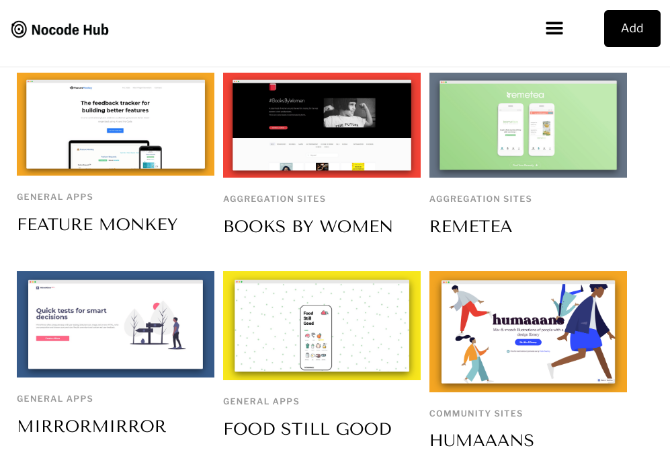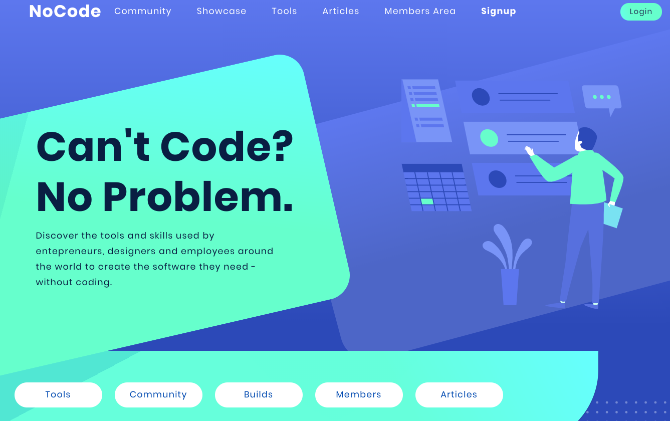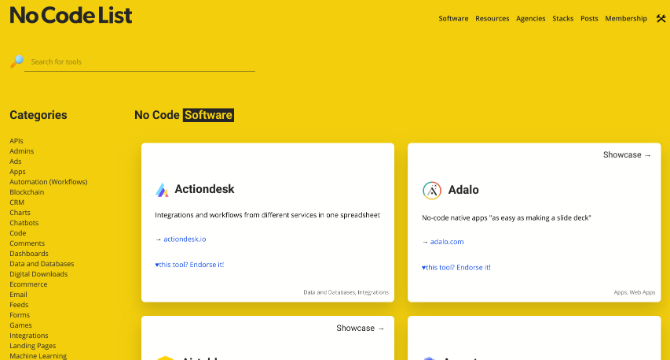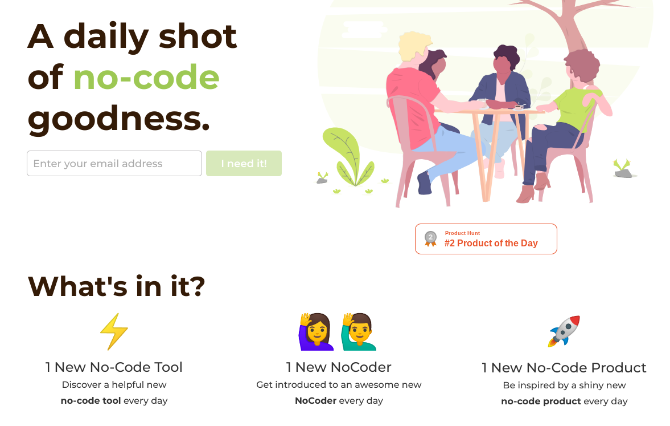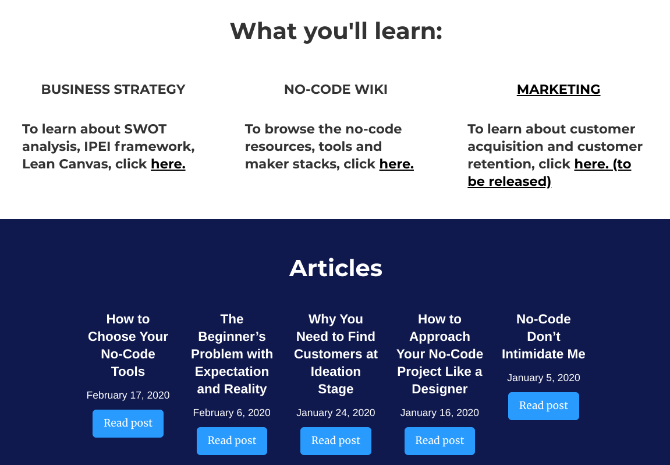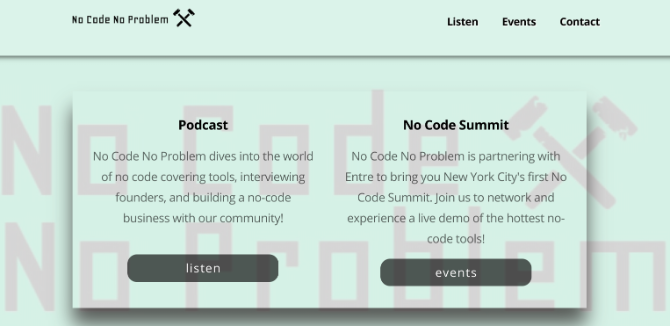The no-code movement is taking the internet by storm. If you want to learn how to build apps, websites, and digital products without any coding expertise, this is where to start.
The idea behind the no-code movement is to allow non-engineers to build a great product. These are specialized tools to develop anything you want, and you don't need any coding knowledge or experience whatsoever. There's a similar other low-code movement which relies on minimal coding experience.
The no-code philosophy is all about empowering non-techies to enter the world of technology. You can't escape smartphones or the internet, but you don't have to hire developers or learn coding to get into them.
1. NotRealTwitter and Nocode Hub (Web): What Are People Building Without Code?
You might think that these no-code websites and apps will be quite basic. Perhaps you can only make static pages or simple online business sites. You couldn't be further from the truth. Nocode Hub is a directory of fantastic sites built without code, and NotRealTwitter has become a shining example of just what's possible.
NotRealTwitter is an entire clone of Twitter, built without code. It looks, feels, and functions like the microblogging social network, and is an experiment to show just how much you can do with no-code sites. Try it out, you can check out the whole system through guest accounts.
Meanwhile, Nocode Hub takes it one step further to showcase products made without code. It largely divides them into eight website categories: aggregation, community, review, matchmaking, job boards, landing pages, marketplaces, and general apps. Each site shows which no-code tools were used to build it, so you can use it as inspiration for your own code-free product. Go ahead, start making.
2. NoCode (Web): Directory of Tools, Articles, and a Thriving Community
NoCode is one of the best places to get started with understanding the no-code philosophy and find the tools you need. The website is a collection of apps that help you build any product without code, see what others are doing, and even talk with community members.
Start with the directory of tools, which spans a number of different categories. You'll find website builders, app builders, form and survey tools, newsletter generators, design tools, customer support, analytics, usability testing, and a whole lot more. Each category has multiple tools, with a short description of what sets them apart.
The showcase is a nice portfolio of "built without code" apps and websites. You can also see which tools were used to build them, and the developers often leave a helpful write-up about their process.
Finally, the articles and community section are where you should head for more information. Both these resources are filled with resources to help no-code makers to find just how to go from concept to execution.
3. No Code List (Web): All the No-Code Resources in One Place
Like NoCode, this is another website that aggregates all the no-code tools, apps, and resources you will need to make your own product.
No Code List divides software into build, grow, and run as large categories, with several sub-categories for every type of program you'd need. It also links projects to tools, so you can see where it is being used. The website adds new software to the database every Friday, and already has the most comprehensive collection among such curators.
The resources section links you to various other websites, Slack channels, communities, and other proponents of the no-code movement. In Agencies and Stacks, you'll find paid services to make your project journey easier.
4. No-Code Coffee (Web): Daily Newsletter for a Quick No-Code Update
Michael Gill is a no-code evangelist who regularly tracks new projects, developers, and tools. He turned this knowledge into a daily email newsletter that serves as a quick update on the world of no-code.
The newsletter comes with three new elements every day:
- A no-code tool to build something cool
- An interesting no-coder to learn from
- An awesome no-code product to show you what's possible.
Each newsletter starts with a quick introductory thought for no-code makers. And of course, Michael adds his own reasons for checking out each of the three recommended items.
Currently, there isn't an easy directory of all newsletters sent so far. But once you sign up and get your first email, open the Mailchimp link in a new to find a link to Past Issues.
5. No-Coders Club (Web): Business Side of No Coding Movement
The no-code movement gives you the tools to build your own product without knowing programming. But there is a lot more to shipping something cool than just the code. If you want to start but don't know where, you'll find good advice from chartered accountant Luqman Z.A.
The No-Coders Club is Luqman's blog to chronicle the journey to making one's own product, mainly looking at the business side of things. There are helpful Wikis along with introductions to concepts like SWOT analysis. Luqman updates the blog with new posts periodically. It started in 2020, so this is a good time to jump on board.
6. No Code No Problem (Podcasts): Listen to No-Coders
Is it really a trending topic if there isn't a podcast dedicated to it? Ryan Myher hosts No Code No Problem, where he interviews makers from the no-code community and talks about new tools.
Like the No-Coders Club, there's also a lot of focus on the business side of building a product without code. By listening to founders share their thoughts, you'll gain valuable insights and avoid beginner's mistakes.
Apart from NCNP, there are a few other podcasts getting in on the action, like the No Code Podcast. It's only three episodes old so far, but it's off to a good start. Do listen to the interviews of the developers of Obviously AI and MakerPad.
Coding Isn't That Hard
Sure, the no-code movement makes it easier than ever to build any tech product you want. But let's not say coding is the devil, and you can perhaps do more if you know the basics.
And you know what? Coding isn't that hard. Plus, the logic you learn is useful in no-code apps too. So try it out, learn the basics of coding in bite-sized lessons.


